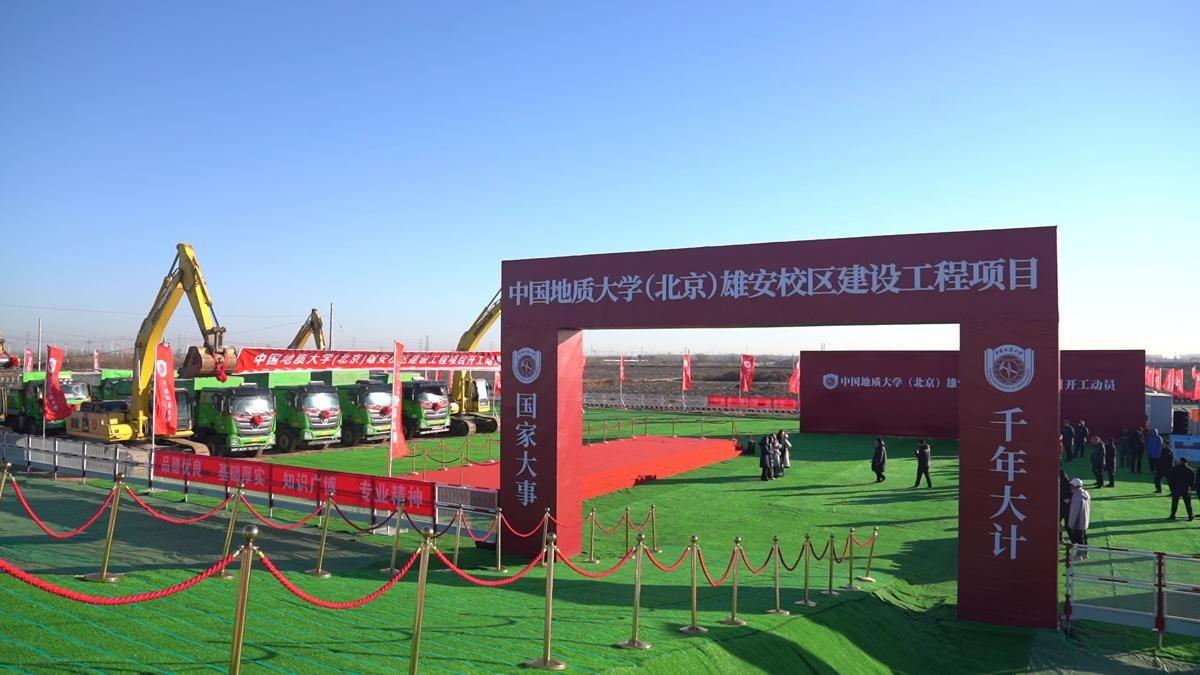 A commencement ceremony for the construction of the China University of Geosciences (Beijing)'s new campus in Xiong'an New Area, North China's Hebei province. (PROVIDED TO CHINA DAILY)
A commencement ceremony for the construction of the China University of Geosciences (Beijing)'s new campus in Xiong'an New Area, North China's Hebei province. (PROVIDED TO CHINA DAILY)
As part of the coordinated development of the Beijing-Tianjin-Hebei region, 15 universities in Beijing will establish new campuses in Xiong'an New Area, marking a new milestone in its development.
Four of the 15 universities — Beijing Jiaotong University, Beijing University of Science and Technology, Beijing Forestry University and China University of Geosciences (Beijing) — started construction of their Xiong'an campuses in November.
All four are directly under the administration of the Ministry of Education and are on the country's list of "Double First-Class "universities and colleges — those of world-class with first-class disciplines.
READ MORE: Beijing, Tianjin, Hebei come closer for development
Beijing Institute of Technology's Xiong'an campus received construction approval earlier this year.
The 15 universities will plan future development based on the concept of "one university, two campuses, and collaborative development".
"The entry of these outstanding universities will bring high-quality talent and technological resources to Xiong'an and even to the higher education sector of Hebei province," Wang Huan'an, head of the research team for innovative mechanisms in the collaborative development of education in the Beijing-Tianjin-Hebei region and deputy director of the development planning office at Capital Normal University, told an industrial forum in Beijing on Sunday.
"This will undoubtedly contribute to the upgrading of local industrial structure and socio-economic development in Hebei province."
The forum witnessed the release of a report on the collaborative development of education in the region that indicated that even though progress has been made over the past decade, there are still disparities in development levels across the three areas. While Beijing and Tianjin hold leading positions in national educational development, education in Hebei province is lagging.
"There are still many differences in educational philosophy, management, and standards among schools in the three regions, which has provided room for cooperation among the three areas," Wang said.
The report proposed the establishment of a comprehensive network governance mechanism and the clarification of the rights and obligations of various entities involved in cross-regional cooperative education.
ALSO READ: China unveils development plans for Beijing-Tianjin-Hebei
On April 1, 2017, China announced plans to establish Xiong'an New Area, located about 100 kilometers southwest of Beijing. The aim was to build a green city on an area of 1,770 square kilometers, featuring innovation and providing a national model of high-quality development.
The new city has been developing rapidly. Schools, hospitals and companies have been setting up branches in Xiong'an and Beijing's municipal government has emphasized its full support of Xiong'an's construction.
By December, State-owned enterprises had set up more than 200 branches in Xiong'an.
This month marks the 10th anniversary of the Beijing-Tianjin-Hebei integrated development initiative being upgraded to a national strategy.
Promoting its coordinated development is of great significance for adjusting and optimizing the economic structure, exploring new models for optimizing development of densely populated areas, and building a world-class urban agglomeration with Beijing as the core.
Zhang Yu contributed to this story.


